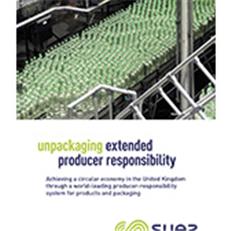Report | Unpackaging extended producer responsibility

The comprehensive strategy, Our waste, our resources: A strategy for England, sets out Defra’s plans for reforming Extended Producer Responsibility (EPR); tackling food waste; simplifying recycling for consumers; eliminating avoidable plastic waste and tackling waste crime, among many other policy areas.
However, Chief Executive Officer of SUEZ recycling and recovery UK, David Palmer-Jones, has warned against the ambition being “watered down”, since much of the detail of the strategy has been deferred for further consultation early next year.
One of the flagship policies outlined in the strategy is the introduction of Full Net Cost Recovery producer responsibility, which requires businesses and manufacturers to pay the full cost of recycling or disposing of their packaging waste. Producers will also be expected to take greater responsibility for items that can be more difficult or more costly to recycle - including cars, electrical goods, and batteries, with the potential to add further items like tyres, mattresses, clothing and furniture, subject to consultation.
Importantly, the strategy suggests that the new producer responsibility regime should help to cover the cost of the transition towards new waste management systems – for example, by delivering vital new infrastructure, which might have otherwise been a potential barrier to progress if government was required to fund it.
The strategy also sets out how collection systems will be simplified for consumers - proposing improved consumer product sustainability labelling and measures to create greater consistency of collected materials, across local authorities, so consumers know what they can recycle and can play their part in driving up recycling rates. This includes weekly food collections and a return to universal free garden waste collections – although both are subject to consultation.
In particular, SUEZ believes that improved labelling will help consumers, and business, buy more sustainably and, when linked directly to more consistent material collection systems and education, should drive an upward trend in both quality and volume of secondary resources.
CEO of SUEZ recycling and recovery UK, David Palmer-Jones, said: "Defra’s strategy represents an ambitious step change in the nation’s journey towards a circular economy and provides positive signals for businesses, consumers and the environment.
"At its core, this strategy demands better coordination between all of those involved in the production and management of waste – from product-design to retail, consumption, collection and recycling or reuse – and will empower businesses across the value chain to work together, helping consumers to make sustainable choices regarding the things they buy and throw away.
"We are particularly pleased to see Defra’s backing for a Full net Cost Recovery model of producer responsibility, which outpaces European counterparts in its scope, although we welcome the fact that businesses will be asked to help determine the detail of this, and other key policy areas, through consultation early next year.
"It is, however, of vital importance that the ambition of the strategy is not allowed to be watered down through the consultation process, but that feedback from businesses and other stakeholders provides an opportunity to implement effective systems which deliver the intended environmental outcomes, while minimising costs to the consumer.
"If implemented correctly, we believe Full net Cost Recovery producer responsibility could provide better funding for council and commercial waste collection and sorting services, and help with the cost of transition towards new systems. It should also lead to greater harmonisation of services, which makes life easier for consumers.
"Making producers fully responsible for the cost and collection of products and packaging will put Britain back among the world leaders for attaining higher recycling rates and driving out waste. This strategy represents the start of a radical, positive, shake-up for our sector and of the way we all view and treat waste in England.”
